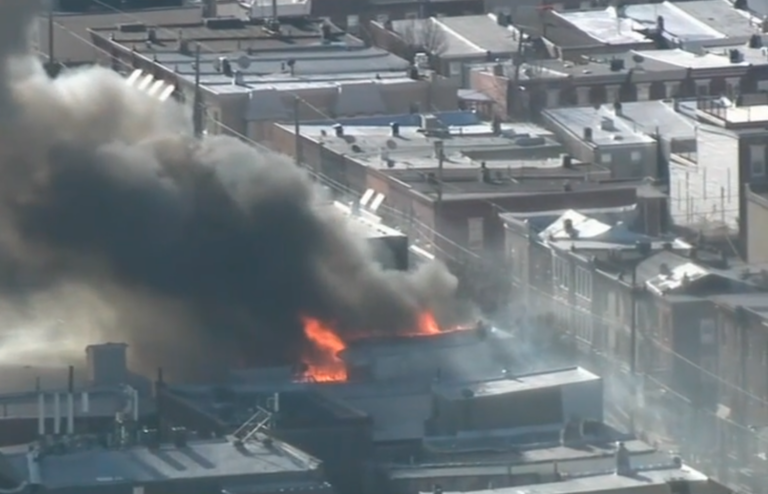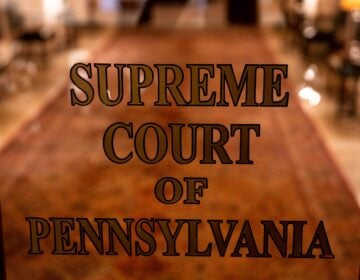PGW to offer free methane detectors to all customers as part of ‘landmark’ settlement
The “landmark” settlement with PUC stems from a 2019 home explosion in South Philadelphia that killed two people and caused $1.4 million in property damage.
Listen 1:09
File - The scene from a December 2019 house explosion on South 8th street in South Philadelphia. (6abc)
This story is part of the WHYY News Climate Desk, bringing you news and solutions for our changing region.
From the Poconos to the Jersey Shore to the mouth of the Delaware Bay, what do you want to know about climate change? What would you like us to cover? Get in touch.
In what the Pennsylvania Public Utility Commission calls a “landmark” settlement, Philadelphia Gas Works will offer free methane detectors to all customers as an “early warning system” to help prevent dangerous explosions from its aging infrastructure. PGW has committed to spend up to $800,000 on the pilot project, which the PUC says is the first of its kind in the nation.
The settlement stems from the December 2019 house explosion on the 1400 block of S. 8th Street in South Philadelphia that killed two people, required the evacuation of 60 residents, and caused an estimated $1.4 million in property damage. The source of the explosion that killed 28-year-old Brian Diu and his 65-year-old neighbor Rudi Kambong was a cracked cast iron gas main that had been installed in 1928 beneath the street in front of the incident site.
The Commission voted unanimously this week to approve the settlement.
“This settlement represents a significant step forward for public safety,” PUC Commissioner Kathryn Zerfuss said in a statement. “By exploring a comprehensive set of prevention measures, innovative detection tools for residents, and expedited infrastructure upgrades, we can better protect Philadelphia’s residents and businesses.”
The “Audible Style Alarm Residential Methane Detector” pilot project, which will include educational materials, will begin within nine months, and detectors will be distributed free of charge until PGW reaches the spending cap of $800,000.
The settlement also has PGW agreeing to seek up to $125 million in federal grants to replace its cast iron mains.
PGW did not immediately respond to WHYY News’ request for comment.
As of 2022, over half of PGW’s more than 3,000 miles of gas mains were considered “at-risk,” or made of cast iron or unprotected steel. Cast-iron mains grow brittle with age and account for a disproportionate share of gas distribution incidents. When the soil that’s holding pipes in place becomes unstable, leaving them unsupported, pipes of any material are at high risk of developing cracks and failing.
Between 2016 and 2020, PGW had an average of 278 cast iron main breaks a year, according to the utility’s records cited by the decision of the administrative law judge who approved the settlement. PGW had conducted annual leak inspections on the block each year since 2014, which resulted in five repairs. In the roughly year and a half prior to the explosion, there were multiple excavations for sewer and water repairs on the block by contractors and the Philadelphia Water Department, including on a water main installed in 1859. PGW responded to eight PA One Call requests to mark underground infrastructure during that period.
The settlement comes after the PUC’s Bureau of Investigation and Enforcement found PGW violated state and federal pipeline safety regulations and recommended a monetary penalty of more than $1.3 million. PGW disputed the BIE’s findings, and the settlement terms found the utility did not violate any regulations. The conditions are in lieu of a financial penalty.
In addition to the methane detectors, and pursuing federal funds to speed up cast iron main replacements, PGW has agreed to beef up its procedures to address “underground street troubles” through education and trainings with PGW workers to identify and report safety issues such as “water or sewer line failures, washouts, floods, or indications of underground cavities.”
It will also take actions to improve communication, education and “collaboration with the Philadelphia Water Department, other city officials, and owners of underground facilities and excavators.”
“Maximizing investment in utility infrastructure as well as investing in the men and women in the trenches doing the backbreaking work of replacing underground utilities – including century-old cast iron gas and water pipes – is our best bet at getting as close to a zero-incident rate as possible,” said PUC Vice Chair Kimberly Barrow, in a statement.
PGW had replaced all the cast iron mains on the block with plastic pipes by April, 2020.
In December, the PUC’s safety division alleged that PGW failed to take action that could have prevented a separate explosion that injured three people on Jackson Street in South Philadelphia in 2021. In that case, which has yet to be resolved, the PUC’s safety division is seeking a penalty of $300,000, along with similar changes to PGW’s safety protocols and a pilot project to monitor for methane leaks in 2,000 homes in the surrounding neighborhood.

Get daily updates from WHYY News!
WHYY is your source for fact-based, in-depth journalism and information. As a nonprofit organization, we rely on financial support from readers like you. Please give today.






